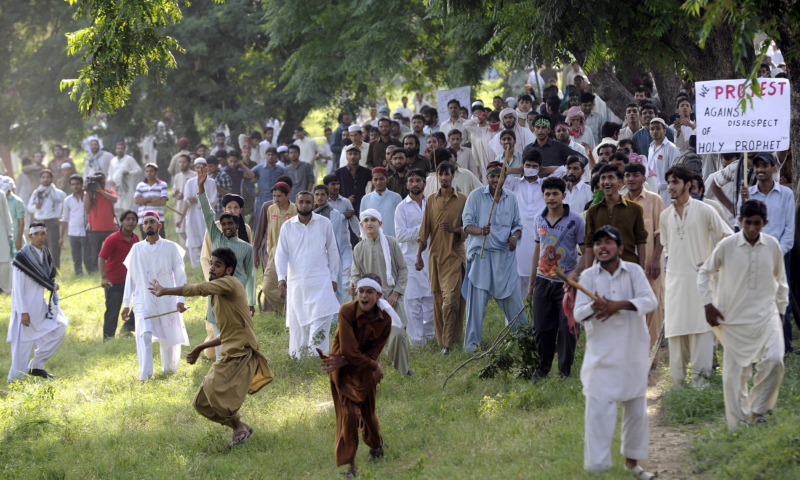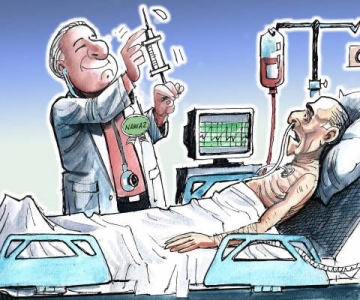The lynching of Mashal Khan by fellow students at an educational campus in Mardan, Khyber Pakhtunkhwa, is a stark reminder of what we have done to ourselves. The barbaric violence by a mob and the inability of the police to prevent it has worried all thinking Pakistanis who have been hoping for a change in country’s direction after a brutal decade of terrorism and violence in the name of religion. One critical dimension of the recent incident relates to radicalisation of our campuses and the conflicting attitudes of Pakistan’s youth.
Last week, I wrote about the problematic school textbooks in Pakistan that influence young minds. They imbibe the half-truths and supremacist ideas and universities seem unable to do much on that front. I remember a distinguished academic narrating his experience of engaging students at a private university in Lahore. He was worried that the best and brightest minds had already been shaped and infused with at best debatable ideologies.
The Islamisation of Pakistan during the 1970s and 1980s and the espousal of jihad as state policy needed public support. Thus education and media turned into major vehicles to achieve that objective. Scared of the anti-regime political mobilisation, Gen Zia also banned student unions, which have remained banned to this day. The exception, of course, being student groups that do their organising in the name of religion. Stifled campus environment and lack of critical thinking, among other things, have been hallmarks of higher education. Sadly, the civilian governments have not attempted to change this and it was only the second military regime in last 30 years that gave some attention to the state of higher education.
It has been widely believed that radicalisation among youth is linked to poverty and deprivation. Those may be important factors but studies have shown that poverty or lack of economic opportunities for social mobility are just facilitators. There is something deeper at work. In the absence of a clear sense of direction, youth in universities have increasingly embraced an identity rooted in religion, and view global politics as a manifestation of an inter-civilisational conflict. This worldview is averse to accepting the accommodate the ‘other’ or finding a way to acknowledge differences for a peaceful co-existence.

A few years ago, Dr Ayesha Siddiqa, a reputed social scientist, conducted a survey at leading private and public sector universities of Karachi, Lahore and Islamabad. The students of these universities had access to greater resources and opportunities as compared to youth at public sector universities in other cities. The survey found that the majority opposed a secular state in Pakistan. Eighty-eight percent of students declared Islam to be their identity and for 57 percent, Islam held an important place in their personal lives. Sixty-two percent supported declaring Ahmadis as non-Muslims, while 51 percent supported the prohibition of liquor. Thirty-three percent believed in gender segregation in the country. Surprisingly, the majority of students expressed aversion to taking part in political activity, with 67 percent ruling out joining any political party.
Admittedly, Dr Siddiqa’s research captured the views of 5 percent of Pakistan’s student body; as only half of the country’s children attend primary school, with a mere quarter of them completing secondary education. Only 5 percent are able to enroll at university. This reflects disengagement of youth from the political process. This will not change until the formation of student unions remains outlawed. In the absence of avenues for engagement with national politics, youth are influenced by the state driven discourses on domestic politics, regional security and Pakistan’s participation in global affairs. This has also increased prevalence of hyper-nationalism among the youth as the textbooks have already taught them that only a national security state can handle the conspiracies hatched by outsiders.
Perhaps things changed a little with the mobilisation by political parties, especially the Pakistan Tehreek-e-Insaf (PTI) in recent years. But PTI’s message has been contradictory at best. On the one hand it had energised young men and women on the platform of hope for ‘change’; but on the other, it also cultivated some level of sympathy for Islamist militants by constantly drumming up the idea of them being ‘our misled brethren’ pitted against the evil West.
Earlier, a British Council survey of youth in 2009 revealed that only 33 percent of young men and women believed in democracy as a system of governance. Another 33 percent supported the imposition of Sharia law in Pakistan, while 7 percent preferred dictatorship. Yet the real insight from that survey was that for most youth, religious identity, regional/ethnic affiliations mattered more than a Pakistani identity.
Sadly, the Pakistani state has encouraged such confusion by not forging a territorial, localised identity. Most Pakistanis, including the youth, view their country as an antidote to the persecution of Muslims by Hindus in a united India and as the extra-territorial guardian of the Ummah. It is a separate matter that most of the Ummah does not accord that leadership role to Pakistan, despite its nuclear prowess.
It is difficult to generalise on the basis of small surveys but Mashal Khan’s lynching and the disturbing scenes circulating on social media testify to a culture of intolerance, which has taken root in our social fabric. It is also a testament to the failure of the education system that is unable to distinguish between a secular humanist and an offensive ‘blasphemer’. The Islamists’ definition of ‘secular’ as la-deen (irreligious or non-believer) is widely accepted 70 years after the Islamic Republic was founded.
We have to simply acknowledge this before thinking of what needs to be done.
Published in Daily Times, April 15, 2017: Let’s accept what we have done to ourselves



